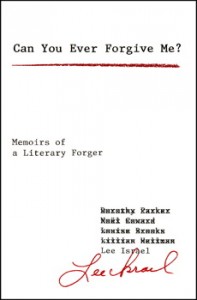January 9, 2015
Lee Israel, novelist and literary forger, dies at 75
by Julia Fleischaker

Lee Israel’s memoir of her criminal life, “running a onewoman forgery scam out of an Upper West Side studio shared with her tortoiseshell cat.” Image and quote via Simon & Schuster.
“’She drank an awful lot — she was an alcoholic,’ David Yarnell, a friend, said in an interview on Monday. ‘And she was very feisty, and people did not want to work with her.’” This is just about the nicest thing anyone says in the obituary of Lee Israel, a writer and acclaimed forger who died in New York on December 24.
In her obituary in The New York Times, Margalit Fox describes a writer whose career had stalled, who turned to literary forgeries to pay her rent, and discovered her greatest talents lay in mimicry. After two fairly successful book releases, Israel’s 1985 biography of Estee Lauder failed to sell, her prospects had dimmed, and she couldn’t conceive of taking an office job.
“I regarded with pity and disdain the short-sleeved wage slaves who worked in offices,” she wrote. “I had no reason to believe life would get anything but better.”
When life did not, Ms. Israel, visiting the New York Public Library for the Performing Arts, slipped three letters by Fanny Brice into her shoe, and by 1991 her new calling was underway.
Israel would research her subjects’ lives for biographical details and learn their writing style using published letters; using period typewriters and paper from vintage journals, she typed the letters and added a forged signature to the end. She wrote and sold letters “written” by Dorothy Parker, Ernest Hemingway, Lillian Hellmann, and more. Fox quotes Carl Burrell, the F.B.I. agent who was the lead investigator on her case, who called her forgeries “brilliant.” Israel apparently agreed; Fox quotes from her memoir, “I still consider the letters to be my best work.”
Her new career ended the next year when her forgeries were discovered, and she was sentenced to five years probabation. She published her memoir, “Can You Ever Forgive Me?” in 2008. She was unapologetic about her fakes, as you can read in these profiles tied to the book release.
Despite the claims of those who knew her, that “she possessed a temperament that made conventional employment nearly impossible,” Israel spent her last few years as a copy editor for Scholastic Magazines, even, according to Fox, commuting daily to their downtown office.
Julia Fleischaker is the director of marketing and publicity at Melville House.